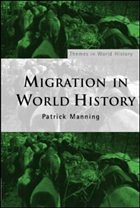This fascinating study traces the connections among regions brought about by the movement of people, diseases, crops, technology and ideas.
Drawing on examples from a wide range of geographical regions and thematic areas, Manning covers:
- earliest human migrations, including the earliest hominids, their development and spread, and the controversy surrounding the rise of homo sapiens
- the rise and spread of major language groups
- examination of civilizations, farmers and pastoralists from 3000 BCE to 500 CE
- trade patterns including the early Silk Road and maritime trade in the Mediterranean and Indian Ocean
- the effect of migration on empire and industry between 1700 and 1900
- the resurgence of migration in the later twentieth century, including movement to cities, refugees and diasporas.
Drawing on examples from a wide range of geographical regions and thematic areas, this book surveys the history of migration, from early humans to the enormous migrations to escape persecution in the nineteenth and twentieth centuries.
Drawing on examples from a wide range of geographical regions and thematic areas, Manning covers:
- earliest human migrations, including the earliest hominids, their development and spread, and the controversy surrounding the rise of homo sapiens
- the rise and spread of major language groups
- examination of civilizations, farmers and pastoralists from 3000 BCE to 500 CE
- trade patterns including the early Silk Road and maritime trade in the Mediterranean and Indian Ocean
- the effect of migration on empire and industry between 1700 and 1900
- the resurgence of migration in the later twentieth century, including movement to cities, refugees and diasporas.
Drawing on examples from a wide range of geographical regions and thematic areas, this book surveys the history of migration, from early humans to the enormous migrations to escape persecution in the nineteenth and twentieth centuries.
"Migration in World History is the most revolutionary and innovative study of migration that has ever been written. It not only shows how systemic migration is for human societies, but also allows the reader to understand its different expressions (invaders, colonizers, sojourners and itinerants) and their impact on social change through time. Furthermore, it can be read as an alternative and truly global history through the lens of mobility and human interactions."
Leo Lucassen, Director of the International Institute of Social History, The Netherlands
"Patrick Manning's Migration in World History displays a broad knowledge of world history that deemphasizes political and imperial interpretations of historical change. Drawing on genetics, anthropology, linguistics, and archaeology - in addition to a lifetime of historical research - Manning argues that the human 'pattern of accelerating innovation through discussion and migration' began not with the Industrial Revolution, nor even the advent of agriculture, but on a more epochal scale with the earliest human travels."
Thomas M. Truxes, New York University, USA
Leo Lucassen, Director of the International Institute of Social History, The Netherlands
"Patrick Manning's Migration in World History displays a broad knowledge of world history that deemphasizes political and imperial interpretations of historical change. Drawing on genetics, anthropology, linguistics, and archaeology - in addition to a lifetime of historical research - Manning argues that the human 'pattern of accelerating innovation through discussion and migration' began not with the Industrial Revolution, nor even the advent of agriculture, but on a more epochal scale with the earliest human travels."
Thomas M. Truxes, New York University, USA
